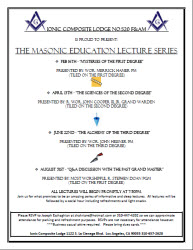What Did Albert Pike Say About the Press & Politicians?
Timely Excerpts from Morals and Dogma
The Press
"The Press is the great sower of falsehood. To slander a political antagonist, to misrepresent all that he says, and, if that be impossible, to invent for him what he does not say; to put in circulation whatever baseless calumnies against him are necessary to defeat him,---these are habits so common as to have ceased to excite notice or comment, much less surpise or disgust."
"There was a time when a Knight would die rather than utter a lie... No profession of an opinion not his own, for expediency's sake or profit, or through fear of the world's disfavor; no slander of even an enemy; no coloring or perversion of the sayings or acts of other men; no insincere speech and argument for any purpose, or under any pretext, must soil his fair escuteon." (1)
Yesterday or Today?
"Government should not foster the strong at the expense of the weak, nor protect the capitalist and tax the laborer. The powerful should not seek a monopoly of development and employment; not prudence only and the expedient for to-day should be appealed to by statesmen, but conscience and the right: justice should not be forgotten in looking at interest, nor political morality neglected for political ecomomy: we should not have national housekeeping instead of national organization on the basis of right." (2)
What is right?
"There are certainly great evils of civilization at this day, and many questions of humanity long adjourned and put off. The hideous aspect of pauperism, the debasement and vice in our cities, tell us by their eloquent silence or in inarticulate mutterings, that the rich and the powerful and the intellectual do not do theri duty by the poor..."
" A sentence is written against all that is unjust, written by God in the nature of man and in the nature of the Universe, because it is in the nature of the Infinite God. Fidelity to your faculties, trust in their convictions, that is justice to yourself; a life in obedience thereto, that is justice toward ment. Nor wrong is really successful. The gain of injustice is a loss, its pleasure suffering. Iniquity often seems to porpsper, but its success is defeat and shame. After a long while, the day of reckoning ever comes, to nation as to individual. The knave deceives himself. the miser, starving his brother's body, starves also his own sould, and at death shall creep out of his great estate of injustice, poor and naked and miserable. Whoso escapes a duty avoids a gain. Outward judgement often fails, inward justice never...(3)
What is magic?
"Magic is that which it is; it is by itself, like the mathematics; for it is the exact and absolute science of Nature and its laws." (4)
Brother Steven Laurvick
S.W. Hackett Lodge No. 574
(1) Morals and Dogma p. 579
(2) Morals and Dogma p. 836-837
(3) Morals and Dogma p. 837
(4) Morals and Dogma p. 841
